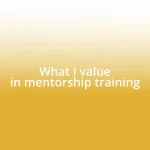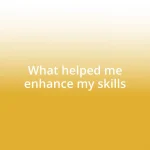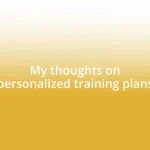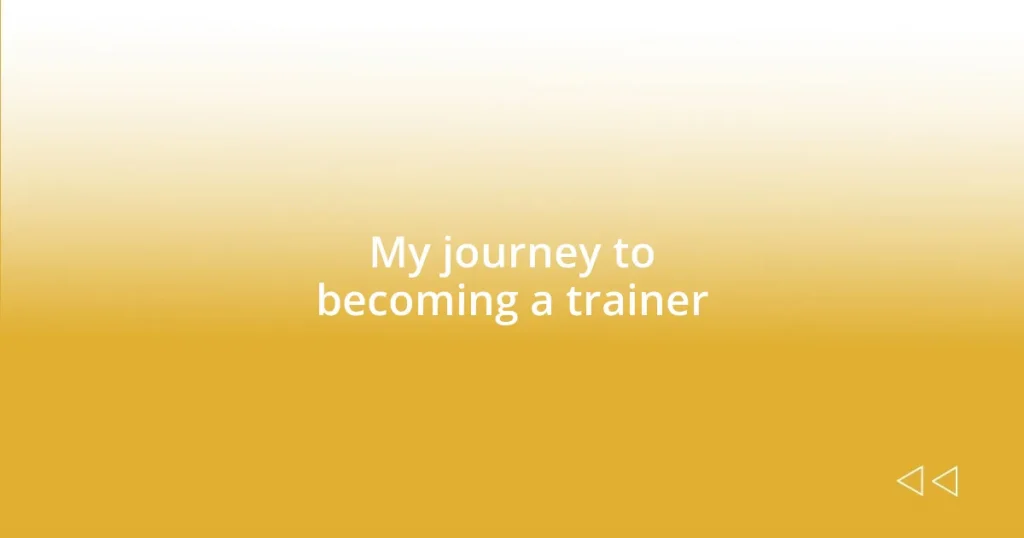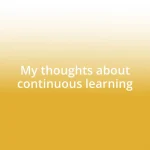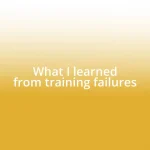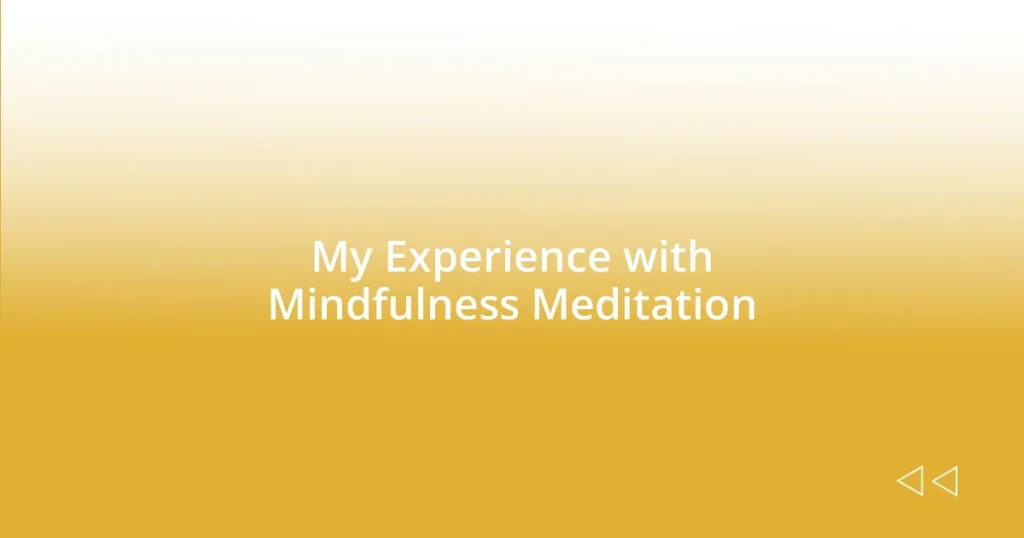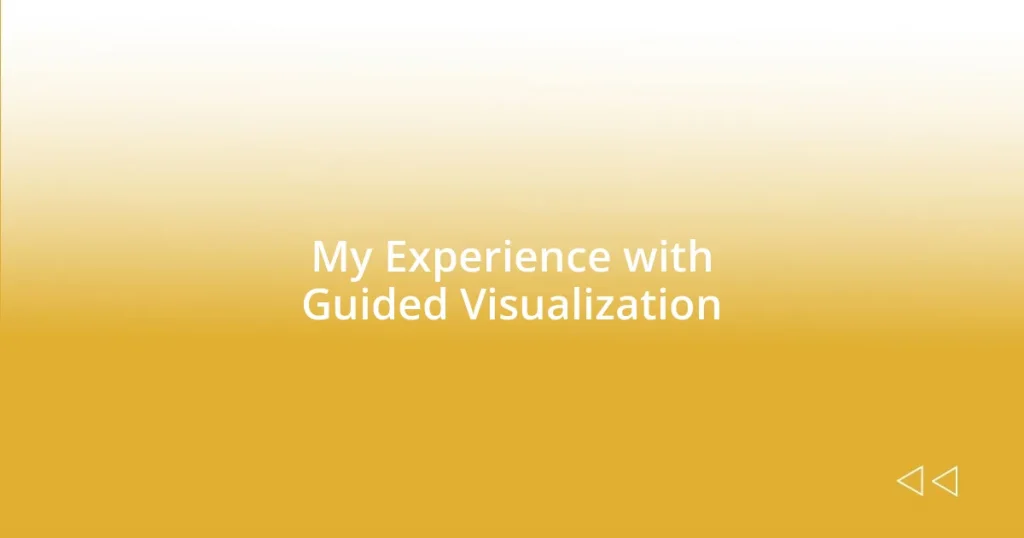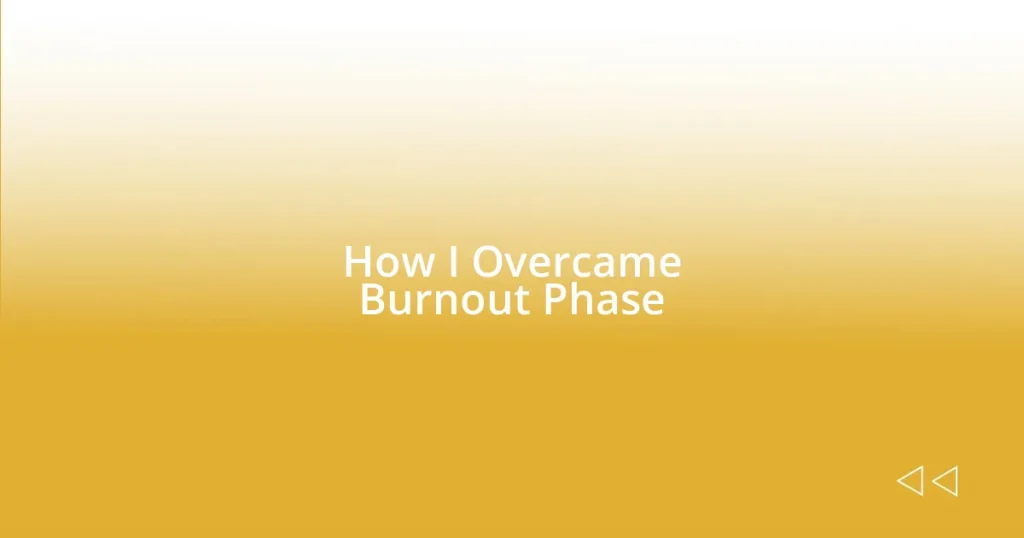Key takeaways:
- Defining clear training goals aligned with passion led to focused progress and fulfillment in teaching.
- Gaining relevant qualifications and continuous learning significantly enhanced training effectiveness and credibility.
- Experiencing live training sessions and embracing feedback fostered personal growth and adaptability as a trainer.
- Networking and sharing personal stories in marketing helped establish a strong professional presence and foster community engagement.
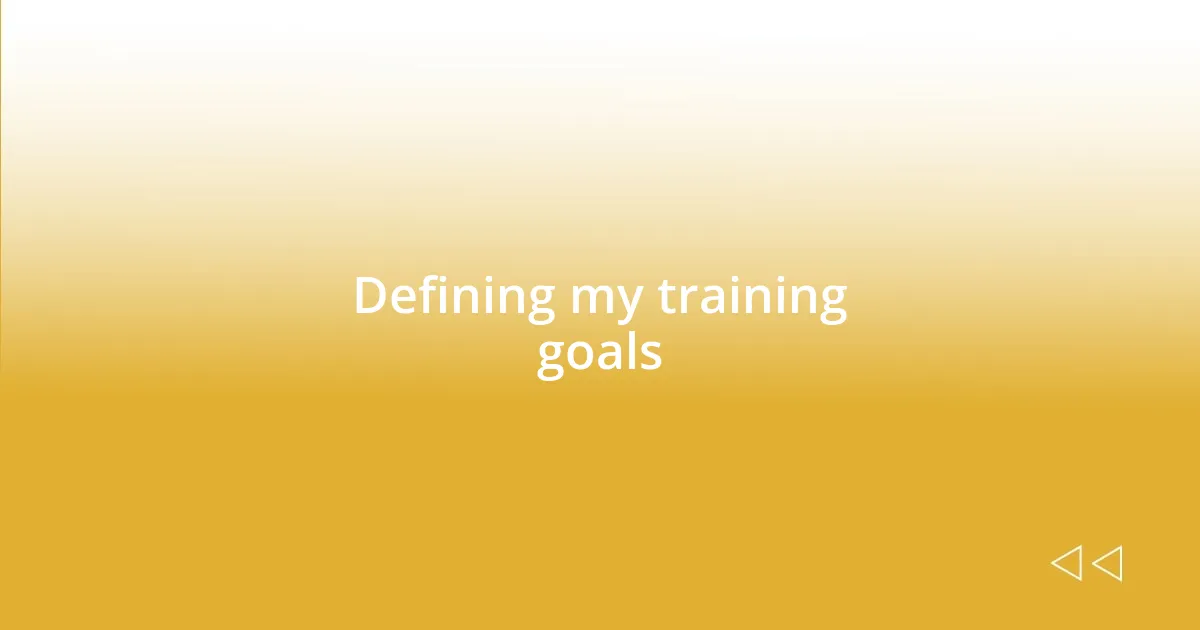
Defining my training goals
Defining my training goals was a pivotal moment in my journey. I remember sitting in a coffee shop one afternoon, staring blankly at my laptop, trying to pinpoint exactly what I wanted to achieve. Was it merely about gaining knowledge, or was it about making a lasting impact on those I would train?
As I reflected on my aspirations, I realized that my goals needed to align with my passion. I wanted to foster an environment that not only educated but inspired growth and confidence in others. Have you ever felt that surge of excitement when you finally articulate what you truly desire? That was my moment—everything clicked.
I set specific, measurable goals for myself, like developing a comprehensive training module within six months. I knew that clarity was essential; without clear aims, I could easily drift off course. The joy I felt when I completed that first training session, realizing I had not only met my goal but also positively influenced others, was unparalleled. Does it make you think about your own journey and what you’re hoping to achieve?
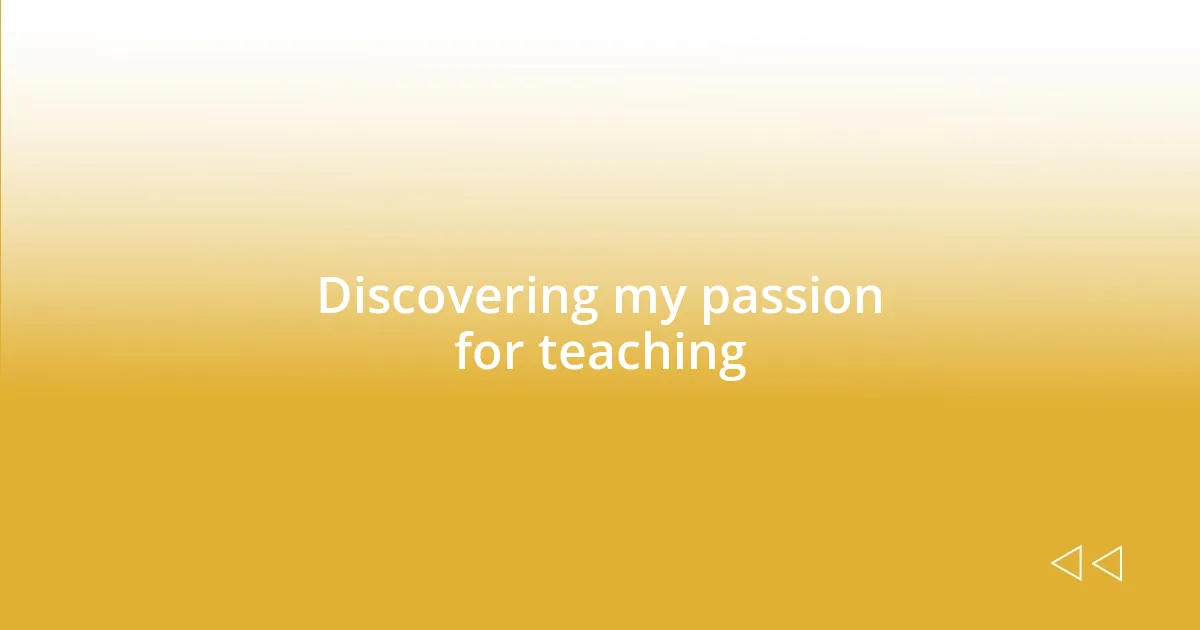
Discovering my passion for teaching
Recognizing my passion for teaching unfolded gradually. I distinctly remember the moment it truly hit me—a colleague invited me to lead a short workshop. Standing before the group, I felt a rush of energy, watching their faces light up as they grasped complex ideas. I realized that sharing knowledge not only ignited enthusiasm in others but also gave me profound satisfaction. There’s something magical about witnessing that ‘aha!’ moment; it’s a reminder of why I fell in love with teaching in the first place.
- Teaching isn’t just about transferring knowledge; it’s about opening doors for others.
- I thrive on the interactions and connections made in the classroom.
- Each session feels like a shared journey of discovery, fueling my passion even more.
Every time a participant expresses gratitude or shares how my training helped them in a real-world scenario, I feel a deep sense of fulfillment. I can still recall the email I received from a trainee who landed their dream job after applying skills they learned in my sessions. Moments like these reinforce that teaching is more than a profession—it’s a calling that invigorates my spirit and motivates me to grow even further.
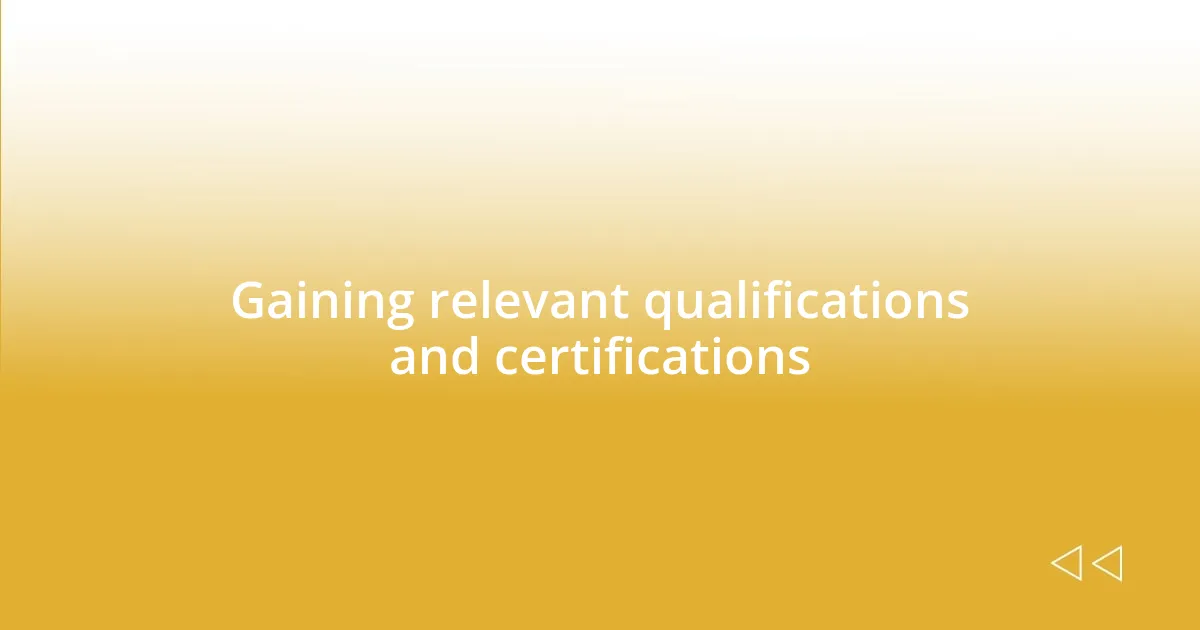
Gaining relevant qualifications and certifications
Gaining relevant qualifications was a crucial step in my training journey. I still remember the first course I enrolled in; it was an intensive program on adult learning principles. At the time, I was a bit unsure if this was the right direction, but completion of that course ignited a fire in me. I learned not only techniques for engaging learners but also the psychological aspects of teaching adults. It was exhilarating to discover how different learning styles could affect information retention—insights that I apply in my sessions to this day. Does pursuing qualifications feel daunting to you? It certainly did for me initially, but the rewards are profound.
Certifications provide credibility, and they opened doors for me that I didn’t even know existed. Just after earning my certification in instructional design, I applied for a role that seemed out of reach before. The confidence I gained from being certified made a tremendous difference. I often think back to that feeling when I received my first official assignment. I felt accomplished, knowing that my hard work had paid off and that my learners would benefit from the knowledge I’d earned. It’s a reminder that qualifications can be more than just letters after your name; they symbolize growth and opportunity.
I also learned that the journey of gaining certifications is ongoing. I embraced lifelong learning and attended workshops and seminars to stay updated. One memorable seminar involved a breakout session where we brainstormed real-world scenarios concerning training challenges. The collaborative spirit was inspiring; I remember exchanging ideas with fellow trainers that led me to rethink my approach entirely. Through this experience, I understood that the learning process does not end with acquiring certifications—it’s merely the beginning of a continuous cycle of growth. What has been your experience with ongoing training?
| Qualification/Certification | Importance |
|---|---|
| Adult Learning Principles Course | Understanding how adults learn enhances training effectiveness. |
| Instructional Design Certification | Provides skills to create engaging learning experiences. |
| Continuous Learning Workshops | Keeps educators updated on the latest training methodologies and trends. |
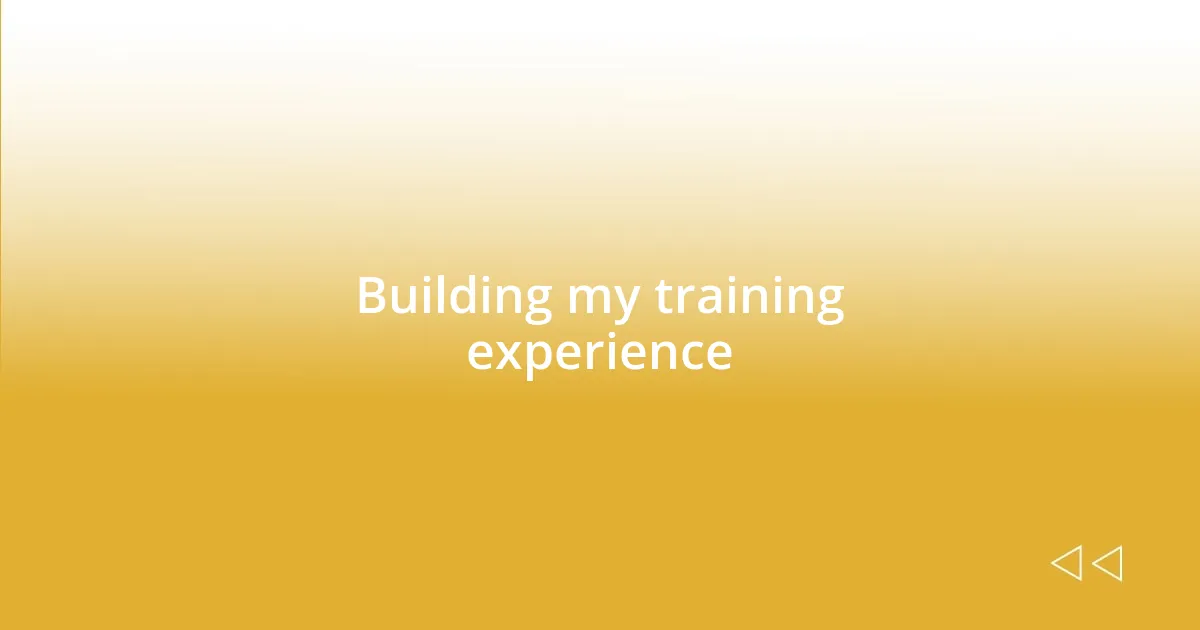
Building my training experience
Building my training experience wasn’t solely about formal qualifications; it was a mix of hands-on practice and learning from every session I conducted. I vividly remember my first live training session; my nerves were on high alert, but I jumped in with enthusiasm. The laughter and engagement of my participants transformed my anxiety into a thrilling sense of purpose. Have you ever felt that exhilarating mix of fear and excitement when stepping into something new? It was a pivotal moment for me, highlighting the real-world impact of my training abilities.
As I navigated through various workshops, I began to understand that each experience was a building block. I can still picture the moment when a participant challenged my approach during a session. Initially taken aback, I realized that embracing feedback was essential for my growth. It taught me that as trainers, we’re not just experts; we’re also learners on this journey. How often do you reflect on feedback to enhance your own skills? The ability to adapt and evolve is what truly shapes us in this profession.
Over time, I not only sought opportunities to strengthen my training skills but also aimed to connect with other trainers. Joining a local training group opened up a treasure trove of insights. I remember a breakout session where we shared our biggest training challenges and brainstormed solutions. The camaraderie was invigorating, and I walked away with fresh ideas that I immediately began implementing. Have you ever experienced the power of collective learning? It’s inspiring and reminds me that the journey of building training experience continues to expand with every interaction and idea exchanged.
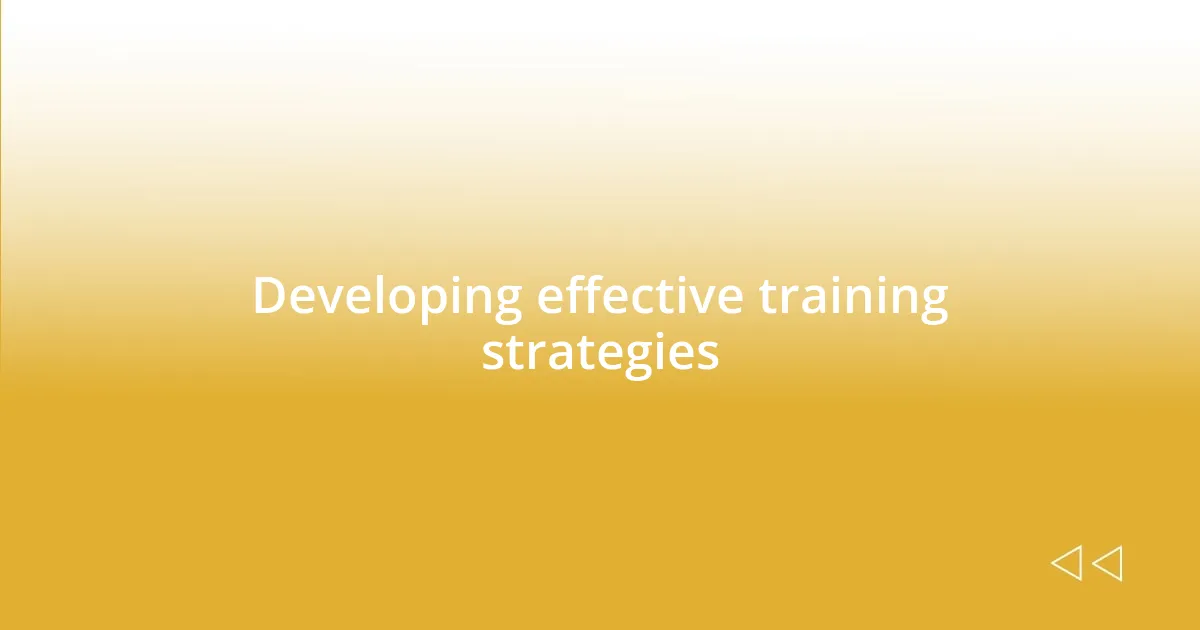
Developing effective training strategies
Creating effective training strategies is both an art and a science. I’ve found that understanding the needs of your audience is a key factor. For instance, when I first designed a training program for a diverse group of learners, I took the time to gather feedback on their expectations and learning styles. This information proved invaluable; it allowed me to tailor my content to resonate with everyone, making the training much more impactful. Have you ever considered how a little input from your audience could shift your approach dramatically?
Moreover, I have learned that using a variety of training methods enhances engagement and knowledge retention. During a particularly memorable session, I incorporated storytelling into my presentation. I shared a personal experience related to the content, which not only piqued their interest but also helped illustrate the concepts in a relatable way. Watching their eyes light up with understanding was a reminder of how powerful a well-crafted narrative can be. Have you thought about how storytelling could transform your training sessions?
In addition to adapting content, evaluating the effectiveness of training strategies is vital. After one workshop, I sent out a follow-up survey to gauge participants’ takeaways. The responses were enlightening, revealing areas that needed improvement. I learned that building in time for reflection helps reinforce the material and allows participants to internalize what they’ve learned. This process not only sharpened my skills but also ensured that my future sessions were increasingly effective. What methods do you use to assess your training impact?
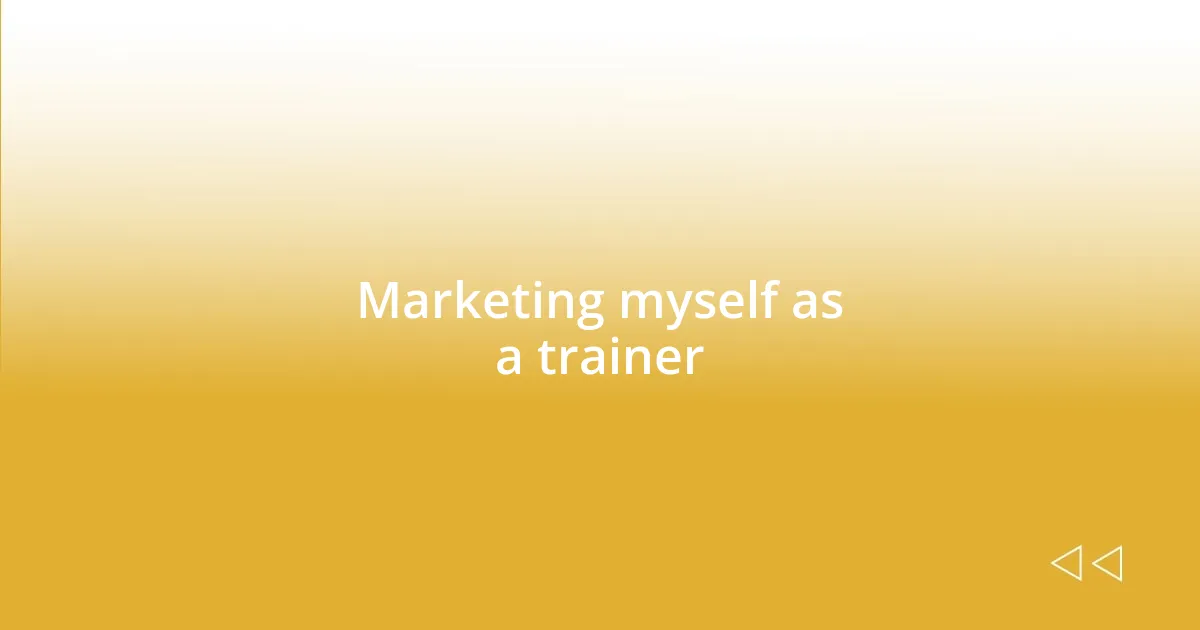
Marketing myself as a trainer
Marketing myself as a trainer has been a journey that required me to embrace both my strengths and the unique qualities I bring to the table. I remember launching my first promotional campaign, feeling a mix of excitement and vulnerability as I showcased what I had to offer. It’s important to ask myself: how do I stand out in a sea of trainers? I found that sharing my personal story not only humanized my brand but also connected deeply with potential clients.
Social media became a vital tool in my marketing strategy. I started posting short video tips and insights from my training sessions, and to my surprise, the response was overwhelmingly positive. It’s fascinating how platforms like these allow you to engage with your audience in real-time. Have you ever noticed how authentic interactions can lead to building a community? My followers began reaching out, sharing their challenges, which led to connections that turned into training opportunities.
Networking also played a crucial role in establishing my presence as a trainer. I recall attending industry conferences where I felt both inspired and intimidated. But when I began sharing ideas and insights with fellow professionals, something magical happened. We exchanged contact information, and suddenly, I had a network eager to collaborate. Isn’t it incredible how one conversation can lead to unexpected opportunities? These relationships have not only helped me market myself but have also enriched my training practices in ways I never anticipated.
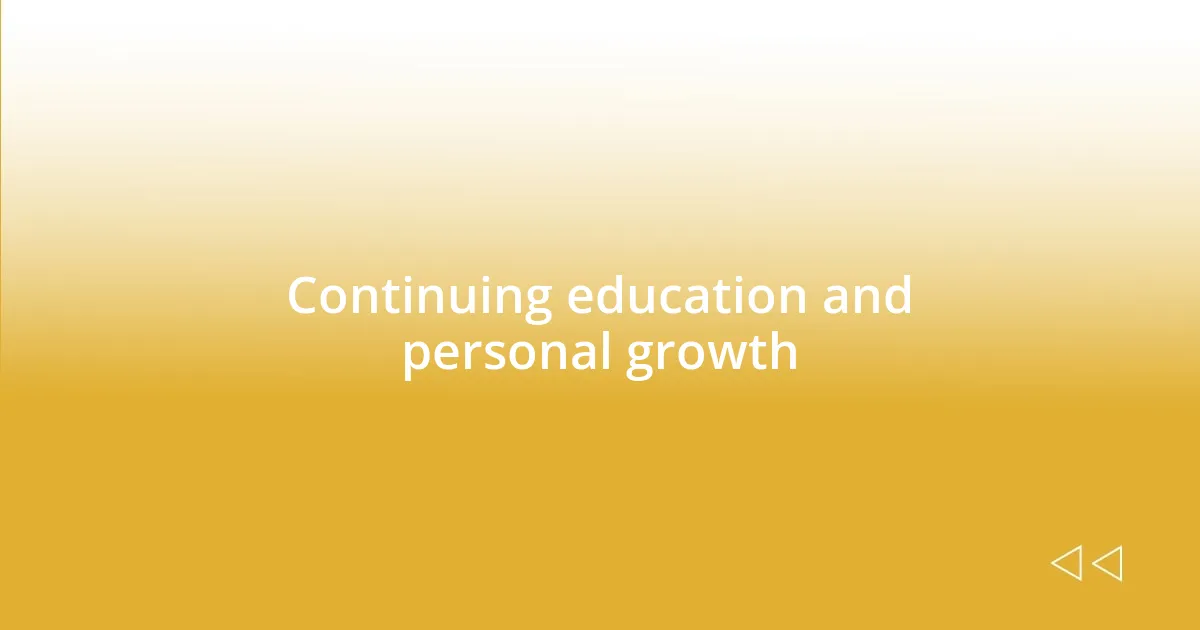
Continuing education and personal growth
Continuing education has been a cornerstone of my growth as a trainer. I vividly remember the first workshop I attended after starting my career. I walked in with a bit of skepticism, questioning whether I’d really gain anything new. But by the end of that session, I was buzzing with ideas and strategies that radically altered my approach to training. Have you ever experienced a moment where a simple piece of advice opened up a whole new perspective for you?
Diving into various courses and certifications has also enriched my skill set. I enrolled in a coaching program that focused on emotional intelligence, and it completely transformed how I interact with participants. Understanding the emotional undercurrents in a training environment has helped me create a safe space for learners to engage authentically. It made me wonder: how often do we overlook our own emotional growth in pursuit of professional advancement?
Additionally, connecting with mentors has been invaluable in my journey. I recall a mentor telling me that learning doesn’t stop at the classroom door; real growth happens by applying what we’ve learned and reflecting on those experiences. Their encouragement pushed me to lead discussions in my workshops, inviting participants to share their own insights. This practice not only solidified my understanding but also fostered a rich, collaborative learning atmosphere. Have you considered how seeking mentorship can elevate your own learning journey?





